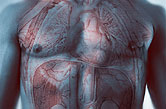- Could Your Grocery Store Meat Be Causing Recurring UTIs?
- Are You Making This Expensive Thermostat Error This Winter?
- Recognizing the Signs of Hypothyroidism
- 10 Strategies to Overcome Insomnia
- Could Artificial Sweeteners Be Aging the Brain Faster?
- Techniques for Soothing Your Nervous System
- Does the Water in Your House Smell Funny? Here’s Why
- Can a Daily Dose of Apple Cider Vinegar Actually Aid Weight Loss?
- 6 Health Beverages That Can Actually Spike Your Blood Sugar
- Treatment Options for Social Anxiety Disorder
Early Signs of Plaque in Arteries Signals Future Heart Trouble: Study


Even the early signs of coronary artery disease significantly increase the risk of heart attack and early death, a new study warns.
Researchers from the U.S. Department of Veteran’s Affairs looked at people with non-obstructive coronary artery disease, which is when there is plaque build-up in the arteries but not enough to obstruct blood flow or cause symptoms such as chest pain.
The investigators found that non-obstructive coronary artery disease significantly increased the risk of heart attack and death during the study.
“This is a key study revealing that no level of established coronary arterial disease is considered OK or safe,” said Dr. David Friedman, chief of heart failure services at North Shore-LIJ’s Franklin Hospital, in Valley Stream, N.Y.
Coronary artery disease, “found in any form, needs to be aggressively treated with well-tolerated and useful medical and procedural treatments,” said Friedman, who was not involved with the study.
“Better natural and lifestyle approaches, as well as patient health behavioral choices, need to be strongly encouraged” to lower the chances of heart attack, he added.
In the study, researchers looked at data from more than 37,000 U.S. veterans. A year after diagnosis, those with non-obstructive coronary artery disease were about 2 to 4.5 times more likely to have suffered a heart attack or died than those with no apparent coronary artery disease.
The study appears in the Nov. 5 issue of the Journal of the American Medical Association.
The findings show that doctors need to understand that non-obstructive coronary artery disease is associated with a significantly increased risk for heart attack, the researchers said.
In addition, the results add to previous evidence showing that many heart attacks are caused by non-obstructive narrowing of arteries, study author Dr. Thomas Maddox, of the VA Eastern Colorado Health Care System, said in a journal news release.
The researchers added that their findings also highlight the importance of drug treatments and lifestyle changes to reduce the risk of heart attack and early death among people with non-obstructive coronary artery disease.
More information
The American Academy of Family Physicians has more about coronary artery disease.
Source: HealthDay
Copyright © 2026 HealthDay. All rights reserved.










